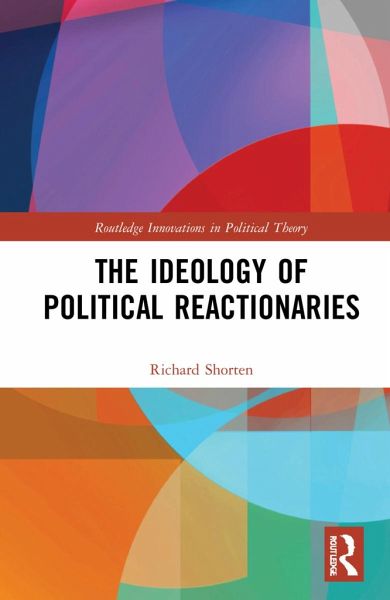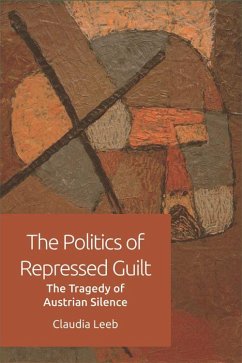Richard Shorten
Gebundenes Buch
The Ideology of Political Reactionaries
Versandkostenfrei!
Sofort lieferbar
Weitere Ausgaben:

PAYBACK Punkte
88 °P sammeln!





The Ideology of Political Reactionaries offers a new perspective on the beliefs reactionaries share, presenting a theory of reactionary ideology in the process. Rather than taking self-contradictions in the reactionary imagination as a reason for diminishment, complexity is taken as a challenge.
Richard Shorten is Senior Lecturer in Political Theory at the University of Birmingham, United Kingdom. His research focuses on the history of modern political ideas, particularly in twentieth-century Europe. He is the author of Modernism and Totalitarianism (2012). He has written widely on topics relating to extremism and political violence.
Produktdetails
- Verlag: Taylor & Francis Ltd (Sales)
- Seitenzahl: 270
- Erscheinungstermin: 31. Dezember 2021
- Englisch
- Abmessung: 232mm x 155mm x 21mm
- Gewicht: 544g
- ISBN-13: 9781032122700
- ISBN-10: 1032122706
- Artikelnr.: 62569834
Herstellerkennzeichnung
Libri GmbH
Europaallee 1
36244 Bad Hersfeld
gpsr@libri.de
"An ambitious book that carefully examines some selected major works of reactionary political thought, investigating them through the appeals of classical rhetoric - logos, ethos, pathos - and identifies in decadence, conspiracy, and indignation the peculiar rhetorical triangle of the reactionary discourse. Comparing modern and contemporary authors, Shorten succeeds in identifying theoretical continuities in the mare magnum of reactionary tradition."
Manuela Ceretta, Università degli Studi di Torino
"This is an ambitious, conceptually sophisticated, and highly original take on "the hard Right," a topic of almost obsessive interest at present. Juxtaposing disparate examples from different
Manuela Ceretta, Università degli Studi di Torino
"This is an ambitious, conceptually sophisticated, and highly original take on "the hard Right," a topic of almost obsessive interest at present. Juxtaposing disparate examples from different
Mehr anzeigen
eras, Shorten argues that "reaction" is what we're dealing with and that rhetoric is the key to understanding it. And he makes a powerful case. So original a book on so fraught a topic is not likely to compel universal agreement, but even those who question this or that will profit from engaging the overall argument."
David D. Roberts, University of Georgia
"In this strikingly original analysis, Richard Shorten casts reaction in a new light. By offering a rhetorical approach to an often inchoate but deeply-held collection of arguments and opinions, he identifies reaction's distinct patterns and makes a powerful case for interpreting it as an ideology in its own right. Shorten's knowledgeable and assiduously-researched book challenges contemporary scholarship and will deservedly claim its place as an imaginative and insightful decoding of right-wing thought."
Michael Freeden, Emeritus Professor of Politics, University of Oxford
"The Ideology of Political Reactionaries makes a strong case for taking reactionary rhetoric seriously and for spending time on their long form work, rather than their speeches. Shorten's analysis of each text is painstaking and piercing. He does an excellent job of comparing them, highlighting their structural similarities."
Ian Hall, The European Legacy
"The Ideology of Political Reactionaries is a worthy exploration and assessment of reactionary rhetoric. Shorten examines well-known texts and speakers through a novel approach. ... With respect to prose, Shorten's is clear, concise, and, at times, lively. To spice things up, he makes occasional allusions to popular fiction. Where he introduces jargon, he is sure to define his terms. The result is a 284-page book that is immensely readable and not at all plodding."
Matthew Slaboch, Perspectives on Politics
"The Ideology of Political Reactionaries is a considerable achievement, moving the debate about reactionary politics beyond well-worn discussions of authoritarian personalities and thin centres. It is a very useful reminder of the ideology embedded in different kinds of narrative, as well as the persuasive power of techniques scholars often dismiss or deride, like the self-pitying anecdote or the deliberate transgression of everyday standards of political propriety." - Ian Hall, Griffith University
David D. Roberts, University of Georgia
"In this strikingly original analysis, Richard Shorten casts reaction in a new light. By offering a rhetorical approach to an often inchoate but deeply-held collection of arguments and opinions, he identifies reaction's distinct patterns and makes a powerful case for interpreting it as an ideology in its own right. Shorten's knowledgeable and assiduously-researched book challenges contemporary scholarship and will deservedly claim its place as an imaginative and insightful decoding of right-wing thought."
Michael Freeden, Emeritus Professor of Politics, University of Oxford
"The Ideology of Political Reactionaries makes a strong case for taking reactionary rhetoric seriously and for spending time on their long form work, rather than their speeches. Shorten's analysis of each text is painstaking and piercing. He does an excellent job of comparing them, highlighting their structural similarities."
Ian Hall, The European Legacy
"The Ideology of Political Reactionaries is a worthy exploration and assessment of reactionary rhetoric. Shorten examines well-known texts and speakers through a novel approach. ... With respect to prose, Shorten's is clear, concise, and, at times, lively. To spice things up, he makes occasional allusions to popular fiction. Where he introduces jargon, he is sure to define his terms. The result is a 284-page book that is immensely readable and not at all plodding."
Matthew Slaboch, Perspectives on Politics
"The Ideology of Political Reactionaries is a considerable achievement, moving the debate about reactionary politics beyond well-worn discussions of authoritarian personalities and thin centres. It is a very useful reminder of the ideology embedded in different kinds of narrative, as well as the persuasive power of techniques scholars often dismiss or deride, like the self-pitying anecdote or the deliberate transgression of everyday standards of political propriety." - Ian Hall, Griffith University
Schließen
Für dieses Produkt wurde noch keine Bewertung abgegeben. Wir würden uns sehr freuen, wenn du die erste Bewertung schreibst!
Eine Bewertung schreiben
Eine Bewertung schreiben
Andere Kunden interessierten sich für













